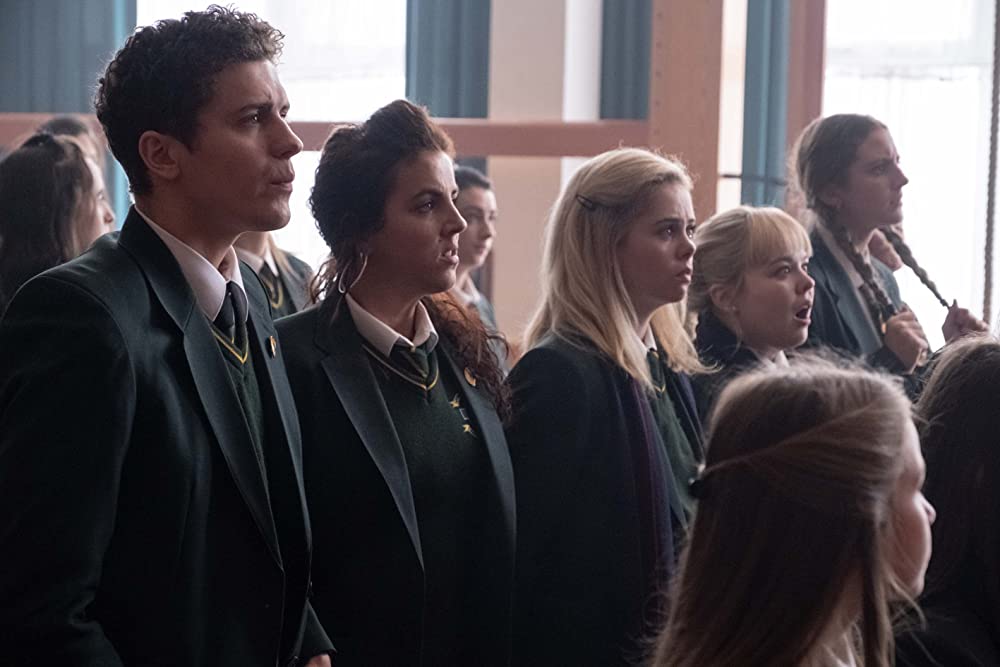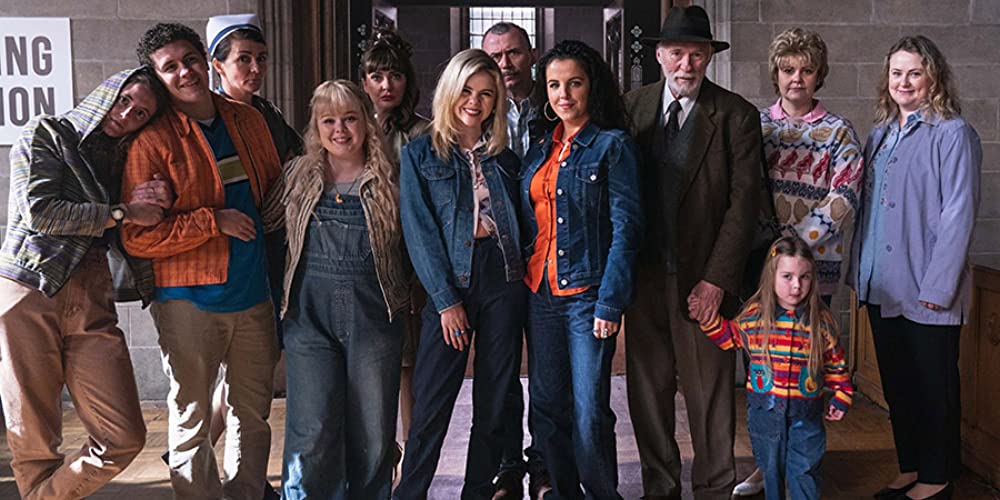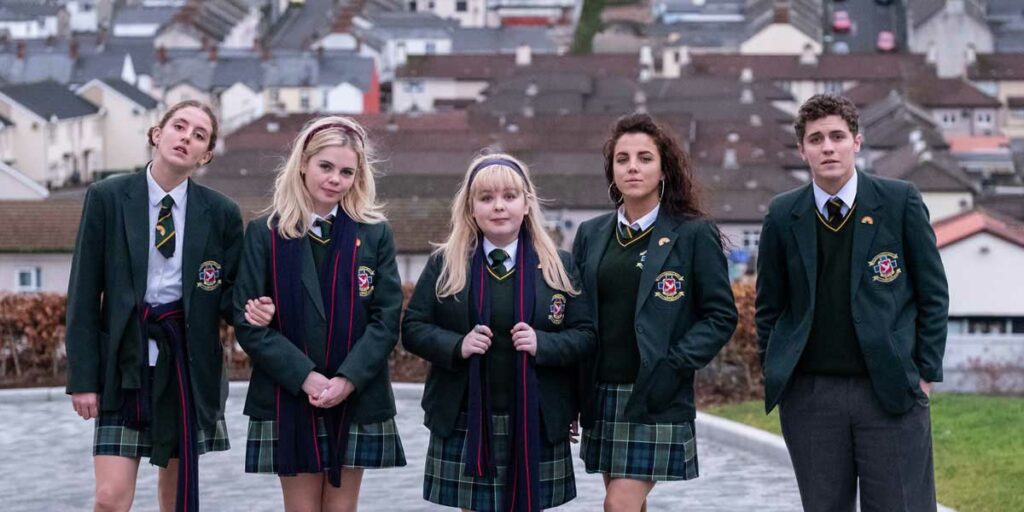As Derry Girls comes to an end, it enshrines itself as one of Channel 4’s greatest comedy sitcoms; a hilarious, joyous and poignant love letter to friendship and family.
Northern Ireland of the 1990s doesn’t seem like the natural setting for one of the best comedy series’ in years. The Troubles, a brutal conflict that lasted the better part of three decades, was coming to a precarious end and the city of Derry (or Londonderry, depending on your persuasion) saw less violence but no less unrest. And yet Derry Girls, created and written by Lisa McGee, is exactly that. It’s a joyous celebration of teenage life; a hilarious and nostalgic exploration of everyday life in extraordinary times.
Erin (Saoirse-Monica Jackson), Orla (Louisa Harland), Michelle (Jamie-Lee O’Donnell), Clare (Nicola Coughlan) and James (Dylan Llewellyn) are a group of friends navigating the trials and tribulations of being teenagers in Derry. The series covers a host of significant moments for them: school trips, exams and talent shows, proms and 18th birthday parties, family holidays, weddings and funerals, concerts and trips to the fare, and – perhaps most importantly – figuring out who you are and who you fancy.
But the show’s location is also vital, as it chronicles the path to peace Northern Ireland was undertaking during the decade. Series 1 ends with Orla (joined by her friends) joyfully performing a step aerobics routine at the school talent show, as the adults tearfully watch news coverings of a fatal bombing. The finale for series 2 takes place as President Bill Clinton visits Derry, but the girls are more content to spend time together than witness the historic event. And then the wonderful, emotional final episode uses the girls’ hopes for the future as a symbol for the feeling of hope that was prevalent at the time, as Northern Ireland balanced on the cusp of the end to a harrowing, heart-breaking period of violence and conflict, ahead of the signing of the Good Friday Agreement.

At its heart, Derry Girls is a series about friendship. The bond between the girls (and James) feels really special and authentic: the ride-or-die, lovingly insulting one minute and fiercely defending the next, everything-feels-momentous type of friendship that shapes those tumultuous years of being a teenager. It’s a dynamic group and each member brings something to it: Erin’s literary ambitions and tendency for self-centeredness, Orla’s quirkiness and tendency to completely miss the point, Michelle’s wit and tendency to push things a bit far, Clare’s smarts and tendency to be a goody-two-shoes, and James’ reality checks and tendency to meekly follow along.
The five of them feel like magic in a bottle. They work so well together and each give really grounded performances. It also just feels like a truly genuine friendship – the unspoken fact that they all consistently wear rainbow pins after one of them comes out is just one example of a subtle but really effective way of emphasising just how much they care about each other. (Especially given the fact that it was a predominantly Catholic area in the 90s.)
From the hijinks to the serious moments, being a ‘Derry girl’ – yes, even James – is something special, and McGee uses her own life experiences to enshrine the ups, downs and shenanigans in between. It’s extremely relatable, even for those of us who didn’t grow up in what was essentially a war zone. Perhaps a bomb threat closing a bridge isn’t something most of us had to experience on our first day of school, but worrying about exam results is. Perhaps our family holiday isn’t designed to avoid a parade of the Orange Order, but the stress of going on one might be. McGee’s brilliant writing emphasises how, even in circumstances so extraordinary, there was still ordinary life to live.
And then there’s the older generation – matriarch Mary (Tara Lynne O’Neill), beleaguered dad Gerry (Tommy Tiernan), Grandad Joe (Ian McElhinney) and the whimsical Aunt Sarah (Kathy Kiera Clarke) – whose experiences of Derry revolve less around teenage angst and more around the realities (and banalities) of life in Troubled Northern Ireland.
McGee’s really adept at giving every character a moment within each episode to shine, big or small, and it really feels like these are real people with real affection for each other. (Even if Grandad Joe is unwilling to let Gerry know that). There’s something about living in Derry in the 1990s that feels really unique, regardless of generation, and the series shapes it into something that can be equal parts connected with and learnt from.

While Derry Girls is ostensibly a comedy, it also isn’t afraid to tackle serious topics. Obviously, the nature of life in Derry at the time meant that things weren’t always rosy, and the moments of shock, when they do come, are truly shocking. But the genius of the show means that they don’t happen in a manner that feels out of place, but rather in a way that feels exactly like real life. There’s no softening of the blows in reality; life can feel like a punch to the gut sometimes and Derry Girls lets it happen. But then it uses its humour – often sharp, pointed and, in typical Irish fashion, making light of the darkness – as a means of carrying on. Because that’s what people do. It’s a clever way of reminding audiences of the realities of life in Northern Ireland without losing focus. The bomb threat is terrifying, but mostly for Aunt Sarah who might miss her tanning appointment. The Orange Parades are daunting prospects for Catholic residents, but especially when a wrong turn has you stuck in the middle of one, pretending to be a Japanese/Australian tourist.
While undoubtedly one of the best, Derry Girls is more than a comedy. It’s more than a tale of teenage life, more than a shenanigan infused sitcom. It’s an often unseen slice of life in Derry in the 1990s; 20 minutes of hilarious jokes, nostalgic music and political references that simultaneously tell a light and frothy episode specific story and paint an overarching portrait of time in the Troubles. The final episode – double the length and more informative than most educational experiences RE: the Good Friday Agreement – is the end of an era. Literally and figuratively. It’s the end of our time with Erin, Orla, Michelle, Clare and James; the end of our time at Our Lady Immaculate College, with the incomparable Sister George Michael (possibly the series’ comedy MVP Siobhán McSweeney). But it also encapsulates the end of three decades of fighting, of tears and fears and suffering.
It’s a sad goodbye, but also a hopeful one. Because while Erin’s making her decision in 1998, hopeful for both her own future and that of Northern Ireland, it’s a reminder for us to do the same. Derry Girls was a momentous moment for television, and absolutely deserves to be seen, enjoyed and understood for years to come. Because being a Derry girl is “a f**king state of mind”, and we should all embrace it.
Derry Girls is now available to watch on digital and on demand.

